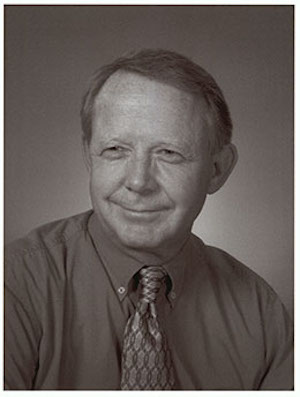Dean L. May
Dean Lowe May was a professor of history, an author, and documentary filmmaker. He was a professor of history at the University of Utah. He also taught as a Fulbright Guest Professor at the University of Bonn, Germany, and Ain Shams University in Cairo.
May was also a Fellow of the Utah State Historical Society and served as chair of the Utah Board of State History. He was editor of the Journal of Mormon History (from 1982 to 1985) and past president of the Mormon History Association in 2002. He specialized in nineteenth- and twentieth-century social and cultural history of the American West through the study of community and family.
May was honored as a Pioneer of Progress in Historic and Cultural Arts by the Days of '47 Celebration Committee for the State of Utah in 2002.
May was born on April 6, 1938, in Worland, Wyoming. When he was nine, his family moved to a farm near Middleton, Idaho, and did chores to help his family on their 40-acre farm. He longed to see the world beyond the farm that was described in the New Wonder World books his parents bought for him.
After he graduated from high school, he attended Brigham Young University and graduated at the top of his college. He spent six months in Paris and Berlin learning to speak French and German. He served a full-time mission in Northern California for The Church of Jesus Christ of Latter-day Saints. He obtained his master’s degree in history from Harvard University in 1967 and his PhD from Brown University in 1974. His dissertation focused on the economics and history associated with the Great Depression and the administration of Franklin D. Roosevelt and was entitled "From New Deal to New Economics: The Response of Henry Morgenthau, Jr. and Marriner S. Eccles to the Recession of 1937."
May's training in economics and history led to a position with the Historical Department of The Church of Jesus Christ of Latter-day Saints in 1974 where he worked with Church historian Leonard J. Arrington. During 1974, he was also a fellow at the Newberry Library and Community History Institute, studying quantitative methods which he used in his studies of Kanab, Utah, and other Western communities. In collaboration with Arrington he revised and expanded a long manuscript by the late Feramorz Y. Fox into the book Building the City of God: Community and Cooperation Among the Mormons. The text examined the social importance of community and discussed unity, individuality, and human imperfection and failure.
In 1977, May joined the History Department at the University of Utah in 1977 where he taught until his death. For six years, he served as director of the university's Center for Historical Population Studies. He received a number of recognition's for his publications and several teaching awards, including the Ramona Cannon Award as the outstanding teacher in the College of Humanities. When the University of Utah completed its new Carolyn Tanner Irish Humanities Building, it posthumously named its western and Utah history library after May, as well as two other rooms in the building.
May wrote and produced an award-winning (over 40 international, national, and regional awards), twenty-segment video series entitled A People’s History of Utah (1981–1988) that was broadcast on public television and used as a supplement to University history courses and in Utah public school classrooms. He also produced a second video series called Utah Remembers that comprised seven 45-minute programs.
During the summer of 2001, May crossed the North Sea and the Atlantic Ocean on the Norwegian built full-rigged sailing vessel Christian Radich. The voyage, called Sea Trek, was a reenactment of the 19th-century Latter-day Saint passages from Europe to the United States. May served as a member of the ship's crew and taught immigration history to his fellow passengers. Seeking to complement the history of the Mormon land migration by wagon and handcart, May focused on the voyage as an element that prepared European converts to forge an Latter-day Saint community identity.
He presented papers at meetings of Western History, Mormon History, and Social Science History Associations. Nearly four dozen of his articles were published in Utah Historical Quarterly, Idaho Yesterdays, Journal of Mormon History, Sociology and Social Research, Population Studies, Agricultural History, Church History, and the Journal of Family History.
May was a contributor to the FDR Encyclopedia and The Harvard Encyclopedia of American Ethnic Groups. His final book, Three Frontiers: Family, Land, and Society in the American West: 1850-1900 (Cambridge University Press, 1994), employs quantitative methods and personal histories to explore three agricultural communities.
He died on May 6, 2003. For the last eight years of his life he sang with the Utah Symphony Chorus. He and his wife, Cheryll Lynn May had two sons and one daughter.
